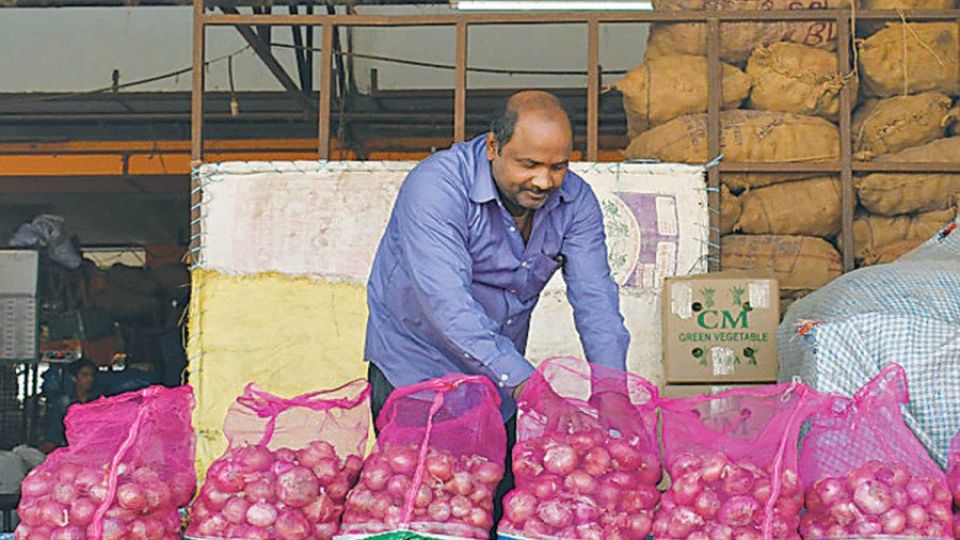December 26, 2023
KATHMANDU – Nepal has turned north to meet its onion demand after its southern neighbour imposed a sweeping ban on the export of the essential kitchen ingredient.
After wheat, rice and sugar, New Delhi on December 8 added dry onions to its list of food staples slapped with sweeping export restrictions.
The move aimed at containing domestic prices ahead of the national election next year.
Prakash Gajurel, the general secretary of the Potato and Onion Traders Association, said that 15-20 tonnes of onions are being sourced from China daily.
“The import from China has increased in the last three days.”
As Nepali households normally don’t prefer Chinese onions due to their taste factor, the demand has not increased, said Gajurel.
Chinese dried onions, which are bigger, have a higher water content compared to Indian onions, due to which consumers prefer Indian onions, said traders. Even though Chinese onions are cheaper, people prefer Indian onions because they taste better.
Traders say that after Nepal started to import onions from China, the essential ingredient has been entering the Nepali market from India too, despite the ban.
According to Gajurel, they are importing 40-60 tonnes of onion daily from India legally.
On December 16, the Kalimati vegetable market received 71 tonnes of onion, the highest in a week after the ban was enforced.
As the imports have been gradually improving, the price of dry onions imported from India which reached Rs200 per kg in the second week of December has dropped slightly to Rs170 per kg in the third week.
In normal times, the country has been receiving 180,190 tonnes annually (500 tonnes daily) from India, worth Rs6.75 billion, according to the statistics of the Department of Customs.
Out of the total imports, the Kalimati vegetable market used to receive 100 tonnes of onions daily.
In November 2019, the price of onion hit a new high of Rs250 per kg in Kathmandu Valley after India banned onion exports in September of the same year to maintain domestic availability.
The ban caused a severe shortage of onion across Asia including in Nepal. The embargo was lifted in March 2020.
Following the ban, Nepal knocked on the doors of Beijing for its onion needs.
As a result, in 2019-20, Nepal imported 2,646 tonnes of onions from China worth Rs158.50 million, the highest imports on record, following the ban by India.
In 2020-21, imports from China dropped to 779 tonnes worth Rs51.29 million.
And since then, Nepal has not imported onions from China.
Traders say they are officially importing onions from India by paying customs despite the sweeping ban; the government authorities, however, are tight-lipped.
“We are not aware how onions are being imported,” said a top official at the Supply Ministry.
“Ask the customs department how they are entering Nepal,” said the official, who requested not to be named.
Officials at the Customs Department, too, said they are not updated either.
The ministry official said that last Friday they wrote to the Indian government through Nepal’s foreign affairs ministry to lift the ban.
As government officials are clueless about how onions are being imported—legally, traders say smuggling has thrived in the bordering areas.
Binay Shrestha, information officer at the Kalimati Fruits and Vegetables Market Development Board, said traders are importing onions from India from their contacts.
“No official decision has been made to lift the ban on onion export by India, and there are no other specific arrangements in place. But due to the open borders, onions are arriving in Nepal—both legally and illegally,” he said.
On Sunday, the average wholesale price of Indian onion was Rs110 per kg. The Chinese onion was priced at Rs95 per kg.
A week ago, the average wholesale price of Indian onion was Rs140 per kg.
According to Indian media reports, onion prices in Indian wholesale markets have fallen by about 50 percent after the government banned its exports.
The result was also evident in Nepal despite the ban.
Shrestha said that the price has dropped in India, and has declined in the Nepali market as well.
The average wholesale price of onion at Lasalgaon Agricultural Produce Market Committee in India was IRs20 per kg on December 19, down from IRs40 per kg just before export was banned.
As onions imported from China are not much in demand in the Nepali market because of their taste, Nepali consumers prefer Indian onions and are willing to pay any cost for it, traders said.
Onions are a staple in South Asian cooking. Countries such as Bangladesh, Nepal, Malaysia and Sri Lanka rely on supply from India. Nepal is almost dependent on onion shipments from India as domestic production is negligible.


